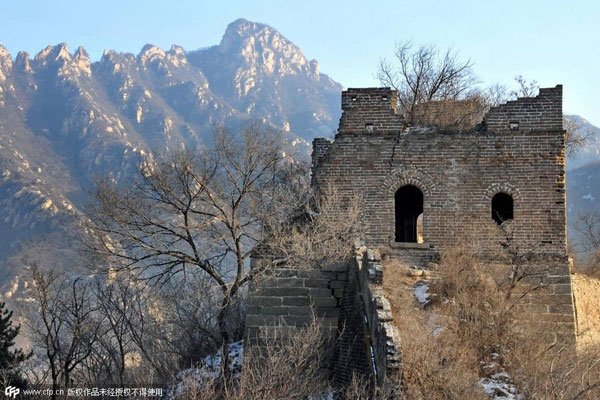Great Wall needs better protection
(Xinhua) Updated: 2015-06-28 20:42
 |
|
A section of the Mutianyu Great Wall in Beijing in dire need of repair, 2013. [Photo/CFP] |
SHIJIAZHUANG -- The Great Wall of China is under assault from both man and nature, and preservation is proving to be no easy task.
Part of the wall running through the wilderness of Funing County in Hebei Province has been left to rack and ruin, with many sections crumbling and large gaping holes.
This is not an uncommon scene. Exposure to the elements has left many parts of the structure too fragile to even withstand bad weather. In 2013, several towers in Funing collapsed during a torrential downpour. One 36-meter section in Hebei was destroyed by a storm in 2012.
Overgrown plants are also accelerating the decay and trees have taken root in between the bricks.
Zhang Heshan, a farmer in Funing, has been a volunteer Great Wall curator for decades. Before removing the trees he carefully takes down the bricks.
It is not just natural forces, but tourism and other human activity that are contributing to the Wall's demise.
In Lulong County, many of the homes are built with thick grey bricks, exactly like the ones used for the wall.
One female villager, who refused to be named, told Xinhua that the poor would steal bricks from the Wall to use as build material, however, she underscored, there is much more interest in protecting the Wall, now.
Despite this, some special bricks -- those that feature ancient Chinese characters -- are still being stolen. The bricks usually change hands for around 40 yuan (6.40 U. S. dollars) on the black market.
- Govt encourages people to work 4.5 days a week
- Action to be taken as HIV cases among students rise
- Debate grows over reproductive rights
- Country's first bishop ordained in 3 years
- China builds Tibetan Buddhism academy in Chengdu
- Authorities require reporting of HIV infections at schools
- Typhoon Soudelor kills 14 in East China
- Police crack down on overseas gambling site
- Debate over death penalty for child traffickers goes on
- Beijing to tighten mail security for war anniversary







